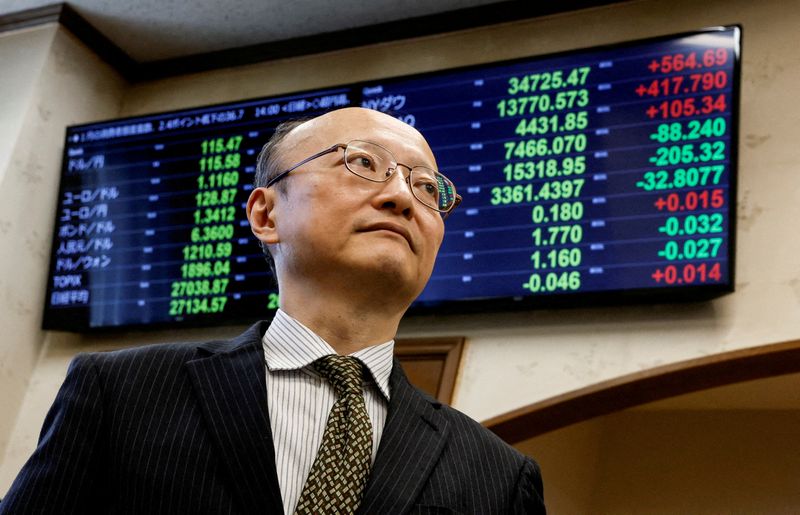Leica Kihara
STRESA, Italy (Reuters) – Japan renewed efforts to counter an excessively weak yen at a G7 finance ministers' meeting over the weekend, after a recent rise in government bond yields to a 12-year high failed to halt the yen's stubborn decline.
The government and central bank efforts highlight the dilemma facing policymakers as they try to balance the need to halt a sharp weakening of the yen that is hurting consumption with keeping borrowing costs low to support a fragile economy.
Following Japan's lobbying, G7 finance ministers reaffirmed their commitment to warn against excessive fluctuations in foreign exchange rates in a statement issued after meeting in Italy on Saturday.
The agreement came after Japan's top foreign exchange official, Foreign Minister Masato Kanda, spoke about the possibility of resuming currency market intervention on Friday, telling reporters that Japan was ready to act “at any time” to counter excessive yen fluctuations.
“If there are excessively destabilizing developments that have a negative impact on the economy, action will be necessary and justified,” he said.
Bank of Japan (BOJ) Governor Kazuo Ueda, who also attended the G7 meeting, expressed the view that sluggish consumption and rising government bond yields would not be an obstacle to the normalization of monetary policy.
Governor Ueda said on Thursday that the drop in first-quarter gross domestic product did not change the BOJ's view that Japan's economy was on track for a gradual recovery. Analysts say the central bank is likely to raise interest rates in the coming months if the economy performs as the bank expects.
He also refrained from commenting on the rise in 10-year government bond yields to their highest level in 12 years, driven in part by market expectations that the Bank of Japan will soon begin to seriously reduce its bond purchases.
Asked on Saturday about the recent rise in Japan's long-term interest rates, Ueda said, “Our basic stance is that long-term interest rates are determined by the market.”
The comments came after a series of hawkish signals from the Bank of Japan, raising market expectations of a short-term rise in interest rates or a tapering of its massive bond purchases.
Ueda has denied using monetary policy to influence the yen's movements, but after the yen's depreciation on April 29 and May 2, raising suspicions of government intervention to buy yen, he stepped up his criticism of the effect of a weaker yen on inflation.
According to a Reuters poll, many analysts expect the Bank of Japan to raise interest rates in the third or fourth quarter of this year.
The Data Cloud Prospects
Ueda also suggested the BOJ is prepared to slowly but steadily raise interest rates if inflation sustainably achieves its 2% target over the next few years as expected.
But the data so far is not a silver lining: Consumption is sluggish as wage growth has yet to keep up with rising living costs.
The inflation rate in the service sector, which the Bank of Japan closely monitors as a key indicator of price trends, has also remained flat.
“Services inflation has likely peaked. I don't think underlying inflation will accelerate toward 2 percent,” said Junichi Makino, chief economist at SMBC Nikko Securities.
Given these weak economic signs, some analysts are starting to pay close attention to whether the Bank of Japan will scale back its purchases of government bonds as part of its efforts to curb the yen's weakening.
Governor Ueda has ruled out using the BOJ's bond purchases as a monetary policy tool after ending its rapid monetary easing in March, but markets continue to closely monitor the bank's operations for clues as to when it might begin tapering.
Some analysts expect the Bank of Japan to decide to reduce its bond purchases as early as its next policy meeting in June.
The yield on Japan's benchmark 10-year government bond hit a 12-year high of 1.005% on Friday as markets expect a tapering of monetary policy in the near future.
But the rise in yields didn't provide much of a boost to the yen, which traded at 156.98 yen to the dollar on Friday, not far from Thursday's low of 157.19 yen, the lowest in more than three weeks.
“The market seems excited about a possible policy shift, but the Bank of Japan is probably calm about all of this,” said Iwashita Mari, chief market economist at Daiwa Securities, dismissing the possibility of a tapering decision in June.
“And there's no guarantee that such actions will stop the yen's depreciation.”
(Reporting by Leika Kihara and Christopher Cushing Editing)


